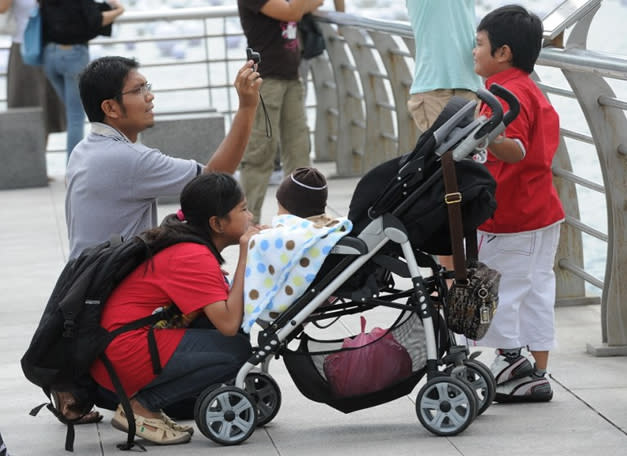Singaporeans, go forth and multiply

COMMENT
Whether in office or out of it, Lee Kuan Yew has this knack for capturing the headlines.
On Aug 12, Singaporeans woke up to the founding prime minister's familiar black-or-white argument: get married and have children, or "this place will fold up because there will be no original citizens left to form the majority".
You can't be more stark and scary than this. The statistics are there for all to see:
Fertility rate way below the replacement level and at an eye-popping level of 1.2 with the dangerous prospect of the population starting to go down from 2025; declining old-age support ratio that will see one senior citizen being taken care of by just two young people in 18 years' time; and ballooning numbers of foreigners (including permanent residents) now making up about 38 per cent of the total population.
In a different Singapore, the solutions would have been obvious and straightforward. Force those who don't marry and have children early to pay higher taxes. Force children to pay for their older parents' upkeep. Keep bringing in more foreigners.
But today's Singapore is a different proposition. The population is more engaged; they have started to use the ballot box to make the government less paternalistic and less heavy-handed.
And throwing money at the problem is not going to work as previous generous payouts to women to have children have not delivered more babies.
Lee talked about the need for a change in the mindsets of Singaporeans. The government's mindset needs to change, too.
It has to start with accepting the reality that Singapore is slowly becoming a normal country.
High-profile corruption and sex scandals, floods, transport crush and breakdowns, slower economic growth and political activism have all made many, especially foreign investors, wonder if Singapore is losing its mojo.
No real need to fret, I say. This is the next phase in the country's journey.
It started as a marshland, then became a metropolis and will, hopefully, move on to being a gracious, accepting and stress-free society.
Ambassador-at-large Prof Tommy Koh is one of the growing number of Singaporeans who are putting forward persuasive arguments for a society that is less focused on making the next million dollars.
An important starting point is the office. Singapore has the dubious reputation of making its people work very long hours, mostly doing unproductive work.
I have met enough young people who are scared to leave for home when there is really no work to do because of the fear that they will be marked down by their bosses.
Tired and stressed-out couples are just not going to have babies in this kind of an environment.
"Our workforce has logged the longest hours' work, yet our productivity figures are among the lowest in the world.
"We have a situation where we are living in the office and yet doing very little -- something is wrong," said sociologist Paulin Straughan at a conference recently.
Other areas to look at: allowing teachers to make classrooms less stressful, incentivising grandparents to look after their children's children, relaxing rules on older singles to adopt and even opening up with surrogacy opportunities. All these would go a long way to signal to Singaporeans that the government is seizing the initiative in the mindset game.
Obvious questions will be asked: will Singapore lose its status as a crown jewel of the East? Will it continue to be a haven for investors? Will it be a welcoming place for talented foreigners?
Yes, if fundamentals like good governance, stability and predictability continue to underpin the new Singapore narrative.
That narrative, which is going to be more difficult to write, will decide if Singapore will fold up or not.
P N Balji has more than 35 years experience as a journalist. He is now a media consultant.


